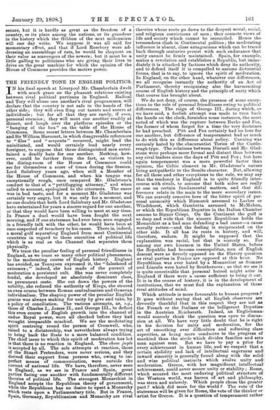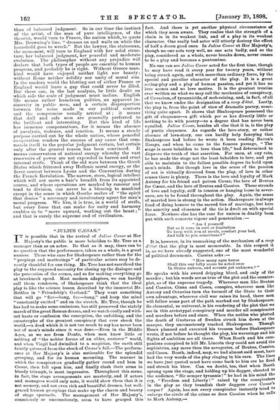THE FRIENDLY TONE IN ENGLISH POLITICS.
IN his final speech at Liverpool Mr. Chamberlain dwelt with much grace on the pleasant relations existing between rival political partisans in England. Radical and Tory will abuse one another's rival programmes, will declare that the country is not safe in the hands of the other side; they will even fling out taunts and sneers at individuals ; but for all that they are rarely, if ever, personal enemies ; they will meet one another readily at dinner, and laugh over the platform episodes or the "banging of the box" on the table of the House of Commons. Some recent letters between Mr. Chamberlain and Sir William Harcourt, in which disagreeable references to " files " and " serpents " occurred, might lead the uninitiated, and would certainly lead nearly every foreigner, to suppose that these distinguished men enter- tained a deadly hate for one another. Nothing, how- ever, could be further from the fact, as visitors to the dining-room of the House of Commons could see for themselves a score of times during the Session. Lord Salisbury years ago, when still a Member of the House of Commons, and when his tongue was exceptionally rough, once compared Mr. Gladstone's conduct to that of a "pettifogging attorney," and when called to account, apologised to the attorneys. The sneer was in bad taste, and for a moment Mr. Gladstone was certainly very angry, but it was only for a moment, and no one doubts that both Lord Salisbury and Mr. Gladstone have entertained for years a sincere regard for one another, or that they would have been willing to meet at any time. In France a duel would have been fought the next morning, and if one statesman had ever been seen engaged. in a friendly talk with the other, he would have been at once suspected of treachery to his cause. There is, indeed, a moral gulf separating England from most Continental countries in regard to these amenities of political life which is as real as the Channel that separates them physically. We trace the peculiar feeling of personal friendliness in England, as we trace so many other political phenomena, to the moderating course of English history. England has avoided, as Tennyson expressed it, the "falsehood of extremes ; " indeed, she has made of the pursuit of moderation a persistent cult. She was never completely feudal, she developed no absolutely dominant class, no permanent caste. She cut down the powers of the nobility, she reduced the authority of Kings, she steered an even course between Roman centralisation and Genevan individualism. The shaping power of the peculiar English genius was always making for unity by give and take, by a policy of conciliation. The various attempts, as, e.g., those of Charles I., James IL, and George III., to deflect this even course of English growth into the channel of undue Royal power, were all checked before they had wrought irreparable mischief. We see the moderating spirit centreing round the person of Cromwell, who, raised to a dictatorship, was nevertheless always trying to bring back the State to a more balanced. condition. The chief issue to which this spirit of moderation has led is that there is no reaction in England. The chose jug& IS accepted by all. The sole attempts at reaction, those of the Stuart Pretenders, were never serious, and they derived their support from persons who, owing to im- perfect means of communication, were outside the current of national life. We have, therefore, never seen in England, as we see in France and Spain, great parties facing one another with fundamentally different theories of political life. The strongest Monarchist in England accepts the Republican theory of government, while the Republican has no desire to upset a Monarchy Which rests upon a Parliamentary title. But in France, SPaill, Germany, Republicanism and Monarchy are rival theories whose roots go down to the deepest moral, social and religious convictions of men ; they connote views of life and society which cannot be reconciled. Hence the tremendous clash in Continental politics ; the moderating influence is absent, class antagonisms which can be traced back through centuries persist with such endurance that unity cannot be firmly maintained. Spain, for example, makes a revolution and establishes a Republic, but imme- diately it is attacked by factions which deny its authority, and to defend itself it is compelled to assume dictatorial forms, that is to say, to ignore the spirit of moderation. In England, on the other hand, whatever our differences, we all recognise instantly the authority of an Act a Parliament, thereby recognising also the harmonising course of English history and the principle of unity which that course has brought about.
We do not deny, of course, the presence of some excep- tions to the rule of personal friendliness owing to political differences. The reign of George III., during which, as we have said, a foolish attempt was made to turn back the hands on the clock, furnishes some instances, the most noted of which was the rupture between Burke and For, the former of whom forgot for a time the very doctrines he had preached. Pitt and Fox certainly had no love for one another, but difference of temperament had as much to do with this as difference about policy. Canning was certainly hated by the obscurantist Tories of the Castle- reagh type. The relations between Disraeli and Mr. Glad; stone were perhaps more formal and distant than between any rival leaders since the days of Pitt and Fox ; but here again temperament was a more powerful factor than opinion, the Celtic element in Mr. Gladstone's nature being antipathetic to the Semite character. But, allowing for all these and other exceptions to the rule, we may say that the tendency in England is to quite friendly inter- course with rivals, to assume that both sides are really at one on certain fundamental matters, and that dlf. ferences relate in the main to the more secondary issues. We can scarcely conceive here of the bitter spirit of per- sonal animosity which Bismarck assumed to Lasker or Virindthorst, which Gambetta assumed to McMahon, or which the Republican Deputies in the Italian Chamber assume to Signor Crispi. On the Continent the gulf is so deep and wide that the sincere Republican holds the Monarchist as a bad man defending a bad cause—a cause morally rotten—and the feeling is reciprocated on the other side. It all has its roots in history, and will, therefore, endure. It might be supposed that the explanation was racial, but that is scarcely so. For among our own kinsmen in the United States, before the Republic had become cosmopolitan, men of English descent were as fiercely opposed on the Slavery question as rival parties in France are opposed at this hour. No Republican was ever hated by a Monarchist as Sumner and Lincoln were hated by Southerners ; so that we see it is quite conceivable that personal hatred might arise in England if there were a cause sufficient to bring it out. It is in the course of history, it is in the development of institutions, that we must find the explanation of these , rival attitudes of mind.
Which attitude is more favourable to human progress ? It goes without saying that all English observers are devoutly thankful that in this respect they are not as the French or the Italians or the belligerent Deputiesi in the Austrian Reichsrath. Indeed, an Englishman" would scarcely think the question was open to discus- sion at all. We have very little doubt that he is right in his decision for unity and moderation, for the art of smoothing over difficulties and softening class. asperities, as being more conducive to the progress of mankind than the strife which divides families and sets, man against man. But we have to pay a price for every achievement in human life, and we suspect that a certain stolidity and lack of intellectual eagerness and1 . inward sincerity is generally found along with the solid and wise political instincts which evolve unity and moderation. Greece, with her magnificent intellectual' achievement, could never secure unity or stability ; Rome, which secured the most enduring political structure of the Western world, was barren of art and philosophy, was stern and unlovely. Which people chose the greater part ? which did more for the world ? The vote of the statesman will be given for Rome, the vote of the thinker or artist for Greece. It is a question of temperament rather
than of balanced judgment. So in our time the instinct of the artist, of the man of pure intelligence, of the theorist, would turn to France, the nation which, to quote Mrs. Browning's line, "dreams on and wails on while the household goes to wreck." But the lawyer, the statesman, the economist, will turn to England with her solid struc- ture, her balanced judgment, her peaceful and moderate evolution. The philosopher without any prejudice will declare that both types of people are essential to human progress, and probably he is right. Without Greece man- kind would have enjoyed neither light nor beauty ; without Rome neither solidity nor unity of moral aim. In the modern world the blotting out of either France or England would leave a gap that could never be filled. But there can, in the last analysis, be little doubt on which side the scale of judgment must incline. English life means rather humdrum politics, an apparent in- sincerity in public men, and a certain disproportion between the noise made in our political contests and the compromise usually arrived at ; it means that dull and safe men are generally preferred to the brilliant and interesting. But this kind of life has immense compensations, for it means the absence of paralysis, violence, and reaction. It means a steady purpose carried out by the whole nation, whose peaceful co-operation renders the success of any cause that com- mends itself to the popular judgment certain, but certain only after the general reason has been convinced. It means conservation of national energy whereby the vast reservoirs of power are not expended in barren and cruel internal strife. Think of the old wars between the Greek States which frittered away Hellenic moral energy, or the fierce contest between Lyons and the Convention during the French Revolution. The narrow, stern, logical intellect which will not move a hair's breadth from its appointed course, and whose operations are marked by rancour and tend to division, can never be a blessing to mankind except in the sense in which Goethe makes of "the spirit that denies" a necessary and involuntary agent for man's moral progress. We live, it is true, in a world of strife, but every force that can make for unity and harmony enables us to "move upward, working out the beast ; " and that is surely the supreme end of civilisation.



















































 Previous page
Previous page